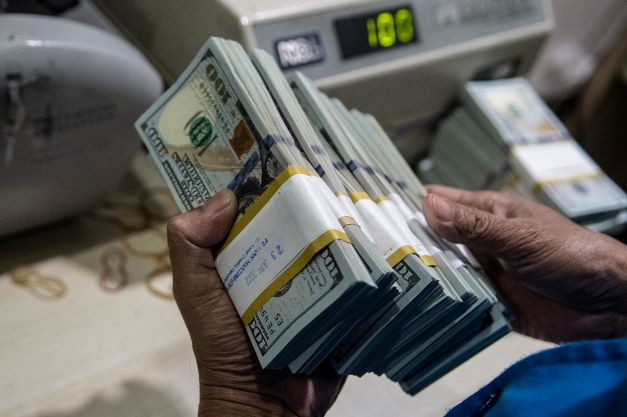Popular Reads
Top Results
Can't find what you're looking for?
View all search resultsPopular Reads
Top Results
Can't find what you're looking for?
View all search resultsTight monetary policy, capital exodus thwart govt bond market
Change text size
Gift Premium Articles
to Anyone
I
nvestors are holding back from the government bond market amid rising interest rates to fend off high inflation in many major economies, leaving emerging countries like Indonesia struggling to keep up with investors’ appetite to secure capital at home.
Bids have been slowing down in Indonesian bonds auctions in the past weeks, analysts from securities and banks noted. On Oct. 11, it reached a multi-year low of Rp 15 trillion (US$961.8 million), Reuters wrote.
Meanwhile, foreign ownerships on government securities have massively tanked to around 14 percent as of Oct. 20, almost a third of pre-pandemic level at around 39 percent, according to a Finance Ministry report.
The trend was in line with the soaring yield of the United States Treasury that achieved a decades-high of 4 percent mark from around 1.4 percent earlier this year, following multiple rates hike by the Federal Reserve (Fed) to 3.25 percent from the past months, with more possible hikes in the future.
“The auctions’ results have shown that we are facing global uncertainties. Many investors set their position to wait and see with reduced appetite to enter the auctions,” Finance Ministry Financing Department head Luky Affirman told reporters on Oct. 21 during a monthly briefing.
Read also: G20 finance chiefs agree to help debt-distressed countries
Indonesian 10-year local-currency government-bond yield has continued to rise in response to higher yields from major economies, hitting 7.64 percent as of Oct. 24, Asian Development Bank data show, whereas in roughly the same period last year, it was just slightly above 6 percent.
Analysts expect the trend will prolong at least until the end of this year and may extend to the first quarter next year, possibly hiking Indonesian yield to between 7.8 percent and 8 percent, with the latter as bad as the volatility that occurred during early months of the COVID-19 pandemic.
Maximilianus Nicodemus, associate director of research and investment at Pilarmas Investindo Securities, added that during a volatile market, investors would wait on whether the yield could continue to rise further; they might enter if the trend stabilizes, as the hike would lower the price of securities which had previously been issued, which investors would try to avert.
Things have become more complicated as investors tend to ask for higher yield to match up to the hike in US Treasury yield, which many consider much safer compared to securities offered in emerging economies, including Indonesia.
“If Indonesia wants to retain investor appetite, like it or not, we will have to respond with a higher interest rate from Bank Indonesia [BI] along with keeping up with higher yield in our government bonds,” Nicodemus told The Jakarta Post on Tuesday.
Read also: Foreign investment growth highest in decades, but outlook ‘bleak’
Josua Pardede, chief economist at private lender Bank Permata, cautioned that if the bid continued to go down, it would be difficult for the government to afford funding needs, as it needed to match the amount of higher yield bid by investors.
At the same time, a higher yield could add a burden to the government budget, as it would increase the amount of money needed to keep up with coupon payments, reducing the amount of spending that could be used to fund other more productive needs for development.
However, Josua said such risks have remained manageable as Indonesia has been able to maintain strong economic fundamentals in terms of inflation and economic growth, which both have been good compared to other countries, which is equally important in remaining attractive for investors.
“We still have room to regain our strength in the market as our fundamental condition can be an upside factor. If the Fed turned to be less hawkish, it would help further in restoring investors’ appetite in our market,” Josua said.
Ramdhan Ario Maruto, associate director of fixed income at Anugerah Sekurities, said on Tuesday that the Indonesian government bond market has been able to remain afloat thanks to strong domestic liquidity along with high appetite from local investors.
He saw that in the short term, the Indonesian market might continue facing pressure from external volatility. Moreover, the situation may possibly be prolonged, as no one knows when the geopolitical tensions, which are partly responsible for this current volatility, will end.
“If the US Treasury remains volatile, investors, particularly foreigners, will remain reluctant and wait longer,” Ramdhan said.
Finance Minister Sri Mulyani Indrawati said on Oct. 21 that the ministry has anticipated the upcoming turmoil by massively reducing bond issuance in this year’s budget plan, which was also partly made possible by high commodity prices and strong growth of tax revenue.
Debt issuance fell by 26 percent annually to Rp 478.9 trillion as of this September, while half the amount of initially planned issuance of Rp 943.7 trillion also remained.
The issuance of the SEC registered last month, however, was an achievement for the Indonesian government as one of the global issuers in Asia that actively issues global bonds, while also became the first Asian country to issue global bonds on the US market in the last four months.










